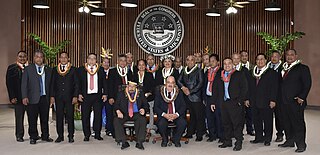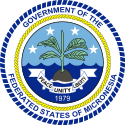Proposition 2½ is a Massachusetts statute that limits property tax assessments and, secondarily, automobile excise tax levies by Massachusetts municipalities. The name of the initiative refers to the 2.5% ceiling on total property taxes annually as well as the 2.5% limit on property tax increases. It was passed by ballot measure, specifically called an initiative petition within Massachusetts state law for any form of referendum voting, in 1980 and went into effect in 1982. The effort to enact the proposition was led by the anti-tax group Citizens for Limited Taxation. It is similar to other "tax revolt" measures passed around the same time in other parts of the United States. This particular proposition followed the movements of states such as California.
The Constitution of Arkansas is the primary organizing law for the U.S. state of Arkansas delineating the duties, powers, structures, and functions of the state government. Arkansas' original constitution was adopted at a constitutional convention held at Little Rock in advance of the territory's admission to the Union in 1836. In 1861 a constitution was adopted with succession. After the American Civil War its 1864 constitution was drafted.An 1868 constitution was passed to comply with the Reconstruction acts. The current constitution was ratified in 1874 following the Brooks–Baxter War.

Parliamentary elections were held in the Federated States of Micronesia on 6 March 2007, alongside a double referendum. Thirty-five candidates competed for the fourteen seats in Congress. As there were no political parties, all candidates ran as independents.

Parliamentary elections were held in the Federated States of Micronesia on 8 March 2005, alongside a three-part referendum. As no political parties existed, all 23 candidates for the 10 available seats in Congress ran as Independents.

Emanuel "Manny" Mori is a Micronesian politician who served as President of the Federated States of Micronesia from 11 May 2007 to 11 May 2015.

California's state elections were held November 3, 1998. Necessary primary elections were held on March 3. Up for election were all the seats of the California State Assembly, 20 seats of the California Senate, seven constitutional officers, all the seats of the California Board of Equalization, as well as votes on retention of two Supreme Court justices and various appeals court judges. Twelve ballot measures were also up for approval. Municipal offices were also included in the election.

Parliamentary elections were held in the Federated States of Micronesia on 8 March 2011, alongside a three-part referendum. As there were no political parties, all 34 candidates ran as independents. For the first time in the country's history, two women ran for election, both in Chuuk State. However, neither was elected.

Parliamentary elections were held in the Federated States of Micronesia on 3 March 1987 alongside a referendum on having a four-year term of office for all members of Congress. All candidates for seats in Congress ran as independents, whilst the referendum proposal was rejected by voters.

Parliamentary elections were held in the Federated States of Micronesia on 7 March 1989 alongside a referendum on electing a Constitutional Convention. All candidates for seats in Congress ran as independents. The referendum was held in compliance with article 2, section 9 of the constitution, which specified that there must be a referendum on convening a Constitutional Convention at least every ten years. It was approved by 71% of voters, and the Constitutional Convention election was subsequently held in 1990.

A referendum on congressional terms was held in the Federated States of Micronesia on 7 March 1995. The proposal to set a four-year term for all members of the Congress required the approval of three-quarters of the voters in at least three of the four states. However, it was only approved by a majority of voters in Kosrae and Yap.

A referendum on the powers of the federal government to levy taxes on imports was held in the Federated States of Micronesia on 4 July 1995. Congress had adopted Public Law 8-135 on the matter, which would have altered article II of Chapter IX of the constitution. However, the move was vetoed by President Bailey Olter on 22 March. As a result, the referendum was held alongside by-elections for Congress. A three-quarter majority was required in three of the four states, but the proposal was rejected by voters.

A four-part referendum was held in the Federated States of Micronesia on 1 July 1999. Voters were asked whether a constitutional convention should be called, whether they approved of a proposal on the distribution of revenues from the country's exclusive economic zone (EEZ), whether the amount of tax revenues distributed to the states should rise from 50% to 70%, and whether states should be given exclusive ownership of their natural resources. The latter three had originally been planned to be held alongside the parliamentary elections in March, but were postponed due to a lack of funds to print the ballot papers.

A constitutional referendum was held in the Federated States of Micronesia on 27 August 2002. Voters were asked whether they approved of 14 separate amendments to the country's constitution. To be approved, the proposal required at least 75% of voters in at least three of the four states to vote in favour. Ultimately all 14 proposals were rejected, as none passed the 75% threshold in any state.

An independence referendum for Chuuk State to secede from the Federated States of Micronesia was originally scheduled to take place in March 2015. However, it has been delayed three times and it is uncertain if it will take place. The most populous of the four states within the FSM, Chuuk has high levels of unemployment and there are long-standing tensions over the distribution of funding within the FSM. Other concerns include political power within the federation and the preservation of cultural identity.

The 1970 Virginia State Elections took place on Election Day, November 3, 1970, the same day as the U.S. Senate and U.S. House elections in the state. The only statewide elections on the ballot were four constitutional referendums to amend the Virginia State Constitution. All referendums were referred to the voters by the Virginia General Assembly.

Parliamentary elections were held in the Federated States of Micronesia on 7 March 2017, alongside a referendum on allowing dual citizenship. Although the proposed constitutional amendment to allow dual citizenship was approved by a majority of voters, it did not pass the threshold of 75% voting in favour in at least three of the four states.

Parliamentary elections were held in the Federated States of Micronesia on 5 March 2019, alongside a referendum on calling a Constitutional Convention. All 14 seats in Congress were up for election, and all 13 incumbents standing for re-election were returned to Congress.

The 2022 California elections took place on November 8, 2022. The statewide direct primary election was held on June 7, 2022.

A referendum on nine proposed amendments to the constitution was held in Micronesia on 4 July 2023. Eight of the amendments were proposed by the Constitutional Convention elected in 2019, and one amendment was proposed by Congress. All nine amendments passed, and were officially ratified by President Simina on 4 October 2023.
The Constitution of the State of Yap, one of the four states of the Federated States of Micronesia, is the fundamental legal text of the State of Yap. It was adopted in 1982, promulgated on December 24 of the same year and came into force on January 1, 1983. Amendments were adopted by referendum and promulgated on November 24, 2006. The constitution comprises 15 articles. It can be consulted in English on the website of the Supreme Court of the Federated States of Micronesia.





